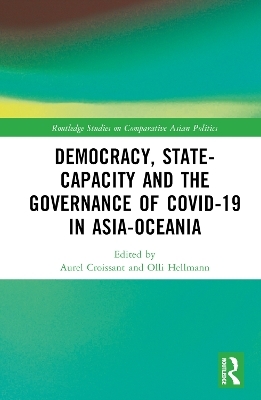
Democracy, State Capacity and the Governance of COVID-19 in Asia-Oceania
Routledge (Verlag)
978-1-032-42365-4 (ISBN)
This book examines the public health responses to the COVID-19 pandemic in the Asia-Oceania region and their implications for democratic backsliding in the period January 2020 to mid-2021.
The contributions discuss three key questions: How did political institutions in Asia-Oceania create incentives for effective public health responses to the COVID-19 outbreak? How did state capacities enhance governments’ ability to implement public health responses? How have governance responses affected the democratic quality of political institutions and processes? Together, the analyses reveal the extent to which institutions prompted an effective public health response and highlights that a high-capacity state was not a necessary condition for containing the spread of COVID-19 during the early phase of the pandemic. By combining quantitative and qualitative analyses, the volume also shows that the effect of the COVID-19 pandemic on the quality of democratic institutions has been uneven across Asia-Oceania.
Guided by a comprehensive theoretical framework, this will be an invaluable resource for scholars and students of political science, policy studies, public health and Asian studies.
Aurel Croissant is Professor of Political Science at Heidelberg University, Germany. His research focusses on issues of democratization, authoritarianism, civil-military relations and Asian politics. Olli Hellmann is Senior Lecturer in Political Science at the University of Waikato, Aotearoa New Zealand. He has previously published on democratization and autocratic regime resilience in East Asia, including in Party Politics and Democratization.
1. Introduction: Democracy and State Capacity during Times of Crisis 2. Policy responses to the COVID-19 pandemic: An aggregate level comparative analysis 3. COVID-19 and Democracy: Creeping Autocratization? 4. Closing the borders to COVID19: Democracy, politics and resilience in Australia and New Zealand 5. Containing COVID-19 in South Korea and Taiwan: State capacity and geopolitics 6. Navigating the Early Impacts of COVID-19: South Pacific Viewpoints from Fiji and Samoa 7. The Pandemic and Competitive Authoritarianism in India 8. Economy First: Indonesia’s Calculated Underutilization of State Capacities and Democratic Resources in the Early Phase of COVID-19 9. COVID-19 in the Philippines and Cambodia: Rising Autocracy and Weak State Capacity 10. Singapore and Hong Kong: The Effect of Trust in High-capacity Hybrid Regimes 11. Proactive Responsiveness and Institutionalization in Vietnam’s Offensive Against COVID-19 12. China’s Response to the COVID-19 Pandemic. Navigating Internal and External Challenges 13. Conclusion
| Erscheinungsdatum | 20.03.2023 |
|---|---|
| Reihe/Serie | Routledge Studies on Comparative Asian Politics |
| Zusatzinfo | 17 Tables, black and white; 1 Line drawings, black and white; 20 Halftones, black and white; 21 Illustrations, black and white |
| Verlagsort | London |
| Sprache | englisch |
| Maße | 156 x 234 mm |
| Gewicht | 580 g |
| Themenwelt | Geisteswissenschaften ► Philosophie |
| Studium ► Querschnittsbereiche ► Prävention / Gesundheitsförderung | |
| Sozialwissenschaften ► Soziologie ► Spezielle Soziologien | |
| Wirtschaft ► Volkswirtschaftslehre ► Wirtschaftspolitik | |
| ISBN-10 | 1-032-42365-X / 103242365X |
| ISBN-13 | 978-1-032-42365-4 / 9781032423654 |
| Zustand | Neuware |
| Informationen gemäß Produktsicherheitsverordnung (GPSR) | |
| Haben Sie eine Frage zum Produkt? |
aus dem Bereich


